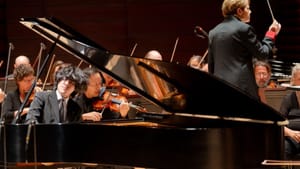Stay in the Loop
BSR publishes on a weekly schedule, with an email newsletter every Wednesday and Thursday morning. There’s no paywall, and subscribing is always free.
A Philly thing at the orchestra
The Philadelphia Orchestra presents John Adams’s The Rock You Stand On, Bartók, and Prokofiev

The world premiere of John Adams’s The Rock You Stand On, in a Philadelphia Orchestra program including Bela Bartók’s Piano Concerto No. 3 and selections from Sergei Prokofiev’s Romeo and Juliet, was definitely a Philly thing.
Yannick Nézet-Seguin and the Philadelphia Orchestra commissioned The Rock You Stand On from the world-famous Adams, and it opened the early October program at Marian Anderson Hall. It was followed by the Bartók (also a world-famous composer in his time), which had its premiere here in 1945. The program closer, music from Prokofiev’s Romeo and Juliet, does not have any distinctive tie to the Philadelphia Orchestra other than the traditionally strong legacy of its performances here, especially in the Ormandy and Muti eras.
A gift to Marin Alsop
Adams specifically refers to The Rock You Stand On as a gift to visiting conductor Marin Alsop, whom he says “is one of the very few conductors whom I can trust to do the right thing with what I’ve written.” The 10-minute work is a rush of bristling energy and represents the current state of the artist’s voice. Despite his youthful reputation and his association with Philip Glass and Steve Reich, Adams is certainly not a minimalist these days, if he ever was one. This new work replaces the steady pulse that characterizes that style with a lurching syncopation and bold exclamation points. The vast orchestration is akin to that of a Mahler symphony, including two harps, as if to exaggerate Adams’s proclivity for lush sonority.
However one wishes to label the ism of the music, The Rock You Stand On is a highly entertaining outing, overflowing with a dramatic profile that feels cinematic. On that point, there are echoes of the movie scores of Bernard Herrmann floating about in the work; notably, the music he contributed to a clutch of Hitchcock flicks (was that a quote from Vertigo?). Alsop’s reading of the music redeemed the appreciation of her by Adams; she brought it off with taut rhythms and bold underlining of the rich colors and textures of the score.
An incisive performance
Bartók’s last years were difficult: as a staunch anti-fascist, his career in Europe was stalled at the outset of war, and he and his wife moved to America in 1940. Despite his great fame, his finances were precarious, and he found it difficult to adjust to the New World culture. This underlying melancholy seemed poignantly expressed in this incisive performance of his final work, the Piano Concerto No. 3, by the brilliant young pianist Yunchan Lim. He found a wistfulness that lurked just beneath the buoyant surface of the opening Allegretto, a quality which then rose to the top in the limpid Adagio religioso movement. The grand finale, replete with zesty Magyar dance rhythms, sounds like a soulful reminiscence of Bartók’s youthful artistic ventures.
Lim’s technique conjures the old question of whether the piano is a percussion instrument or a string instrument. For this outing, Lim leaned more to the percussive personality of the keyboard, as heard in his glassy tone and crystalline voicing. It served Bartók’s craggy music aptly. Lim played an unusual and serenely beautiful encore: his own set of improvisations on a Russian folk melody.
A beloved orchestral work
Prokofiev’s music for the ballet Romeo and Juliet is unquestionably one of the most beloved orchestral works of the 20th century. This is the music of a once-brash young modernist who evolved into an unabashed neo-Romantic. The suite assembled from the complete ballet is a tremendous orchestral showpiece, and it is littered with solo lines typically played by an orchestra’s principal players.
The superb first chairs of this particular ensemble are in especially fine fettle in this current generation, and so it was a bit disappointing to hear the lack of emotional depth and conviction in so many of their singular opportunities. Of course, there were still plenty of fireworks to revel in, such as the stunning virtuosity of the strings in the "Death of Tybalt" scene. It did not lift the overall presentation to the stellar level that should be taken for granted with this band. There’s an old saying that the Philadelphia Orchestra can play the phone book and make it sound great. That should not be an excuse to phone in a performance.
What, When, Where
Philadelphia Orchestra presents John Adams, The Rock You Stand On; Bela Bartók, Piano Concerto No. 3; and Sergei Prokofiev, Romeo and Juliet (selections). Conducted by Marin Alsop. Yunchan Lim, piano. October 3-5, 2025, at Ensemble Arts Philly’s Marian Anderson Hall, 300 S Broad Street, Philadelphia. (215) 893-1999 or philorch.ensembleartsphilly.org.
Accessibility
Ensemble Arts Philly venues, including Marian Anderson Hall, are wheelchair-accessible.
Sign up for our newsletter
All of the week's new articles, all in one place. Sign up for the free weekly BSR newsletters, and don't miss a conversation.
